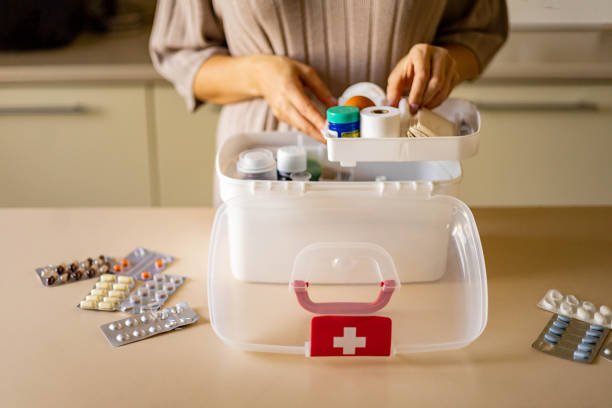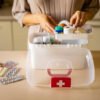Accidents and health emergencies can happen anytime, especially at home. Whether it’s a small cut, a sudden fever, or a more serious condition, being prepared makes all the difference. That’s why having a well-stocked medical supply kit at home is essential for every household.
Having medical supplies at home is important for emergencies. A cut, burn, or fever can happen anytime, and being ready helps you stay safe. This article lists the basic medical supplies every home needs, including products from Family Care, a trusted brand for quality supplies.
The purpose of this article is to guide you through the must-have medical supplies for home, how to organize them, and where to buy them to ensure your family’s safety and peace of mind.
Why You Need Medical Supplies at Home
Small accidents or illnesses, like cuts or colds, can happen suddenly. Having supplies ready means you can act fast, save money on doctor visits, and feel secure knowing your family is protected. Unexpected health issues don’t always allow time to rush to a pharmacy. Having essential medical supplies at home ensures you can:
- Handle common scenarios: Cuts, burns, fevers, sprains, and allergic reactions.
- Respond quickly: Immediate care reduces complications.
- Save money: Avoid unnecessary emergency room visits.
- Enjoy peace of mind: Knowing you’re prepared adds a sense of security.
Preparedness is more than convenience—it’s a step toward overall family health, safety, and well-being.
Must-Have Medical Supplies for Every Home
Here are the key items to keep at home:
First Aid Kit Basics
- Bandages (different sizes): Family Care’s waterproof bandages work well for cuts.
- Gauze pads and tape: Family Care’s sterile gauze keeps wounds clean.
- Antiseptic wipes: Family Care’s wipes or alcohol pads clean cuts safely.
- Tweezers and scissors: For removing splinters or cutting bandages.
- Thermometer: Family Care’s digital thermometer checks fevers quickly.
Medicines
- Pain relievers: Family Care’s ibuprofen or acetaminophen for pain or fever.
- Allergy medicine: For allergies or rashes.
- Stomach medicine: For upset stomachs or diarrhea.
- Prescription medicines: Store safely for family members who need them.
Injury Supplies
- Elastic bandages: Family Care’s ACE bandages help with sprains.
- Cold packs: For swelling or bruises.
- Burn cream: Family Care’s burn gel soothes minor burns.
Other Important Items
- Gloves: Family Care’s nitrile gloves keep things clean.
- Face masks: For sickness or caregiving.
- CPR face shield: For safe emergency help.
- Emergency contact list: Keep phone numbers and medical info handy.
Supplies for Special Needs
Add items based on your family:
- Chronic illnesses: Family Care’s glucose monitors for diabetes.
- Kids: Child-safe medicines or smaller bandages.
- Seniors: Family Care’s blood pressure monitors or mobility aids.
Additional Supplies for Specific Needs
Every family has unique medical requirements. Consider these additions:
- For chronic conditions: Glucose monitor (for diabetes), inhaler (for asthma).
- For children: Child-safe medications, pediatric thermometer, baby nasal aspirator.
- For elderly members: Blood pressure monitor, mobility aids, arthritis-friendly products.
By tailoring your home medical kit to your family’s needs, you ensure better safety and quicker recovery in emergencies.
How to Store and Check Your Supplies
Keep supplies in a cool, dry place, like a labeled box or cabinet. Check them every 6 months to replace expired items. Make a list to track what you have. Store supplies where kids can’t reach, but adults can get them easily.
How to Organize and Maintain Your Home Medical Supplies
- Storage: Choose a cool, dry, and easily accessible spot.
- Check regularly: Replace expired medications and used items.
- Inventory checklist: Keep a simple list for restocking.
- Child safety: Store supplies out of children’s reach but ensure quick adult access.
Where to Purchase Medical Supplies
When buying medical supplies for home, you have two main options:
- Local pharmacies for immediate purchases.
- Trusted online retailers like Family Care in Pakistan ensure authentic medical products sourced directly from top brands.
Always check product certifications and reviews. Building your home first aid kit doesn’t have to be expensive—Family Care also offers budget-friendly options for every household.
FAQs
1. How often should I check my home medical supplies?
At least every 3–6 months to remove expired medicines and restock essentials.
2. What’s the difference between a basic and an advanced first aid kit?
A basic kit covers minor injuries (bandages, antiseptics), while an advanced kit includes tools like CPR masks, splints, or chronic condition devices.
3. Can I customize my medical supplies based on my family’s needs?
Absolutely! Families with children, elderly members, or chronic conditions should add personalized supplies.
4. Where should I store my home medical kit?
In a cool, dry place that’s easily accessible in an emergency, but secure from children.
Conclusion
Emergencies don’t wait—and neither should you. Having a well-prepared home medical kit allows you to act quickly, confidently, and effectively during health crises. From adhesive bandages to prescription medications, these supplies ensure you’re ready for anything.
By choosing reliable products from Family Care, you protect your loved ones with high-quality and authentic medical supplies.
Don’t delay—check your medical supplies today, replace expired items, and update your home first aid kit. Being prepared could save a life tomorrow.








Add comment